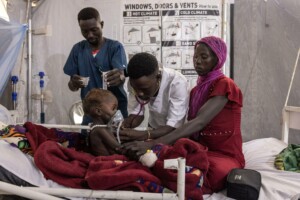Jaundice syndrome, hepatitis E in North Darfur camp
Diseases prone to epidemics such as hepatitis E and acute jaundice syndrome spread in North Darfur’s Sortony camp for the thousands of displaced people who have recently fled from Jebel Marra.
Diseases prone to epidemics such as hepatitis E and acute jaundice syndrome spread in North Darfur's Sortony camp for the thousands of displaced people who have recently fled from Jebel Marra.
The United Nations Office for the Coordination of Humanitarian Affairs (OCHA) announced last week that 45 new cases of acute jaundice syndrome were reported in Sortony. This brings the total to 121 cases starting last May. The disease mostly breaks out in areas where people live in cramped conditions, with poor water supply and insufficient sanitation and hygiene facilities.
Acute jaundice syndrome is epidemic-prone and water borne, transmitted with a faecal-oral route through contaminated water. It can be a symptom of epidemic-prone diseases including dengue, hepatitis A or E and yellow fever.
The WHO reported that 61 percent of the cases are male, 9 percent are children below 5 years of age and 32 percent of the patients needed hospitalisation. All seven samples sent for laboratory analysis tested positive for hepatitis E.

OCHA added that there are significant health risks arising as a result of over 4,500 livestock living in close vicinity to the displaced people in Sortony.
Sortony remains the shelter for approximately 22,600 people who have fled from Jebel Marra, the mountain range south of Kabkabiya, during the fighting between government and militia forces against armed rebels that started mid-January.











 and then
and then